Obtaining authentic child perspectives
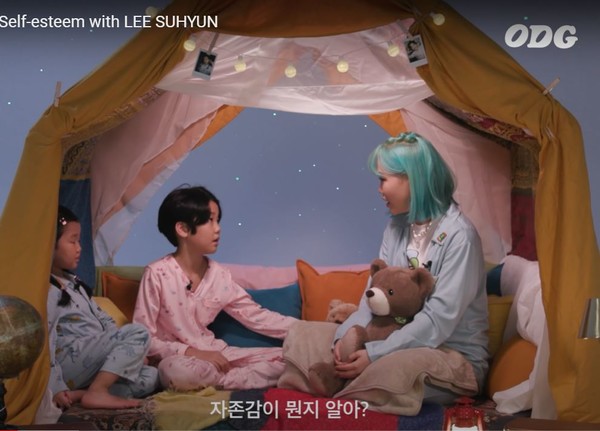
KOREAN CHILD variety show content on YouTube and Netflix has been continuously gaining attention as a distinct brand, with viewers appreciating the endearing children appearing in programs like The Return of Superman and Cool Kids. However, in recent years, Korean child variety content has become more than just entertainment featuring cute children talking candidly. With the onset of Hallyu 3.0[1] in 2016 and the increased interest in all things Korean, including Korean variety shows, directors are experimenting with child variety shows by portraying relevant sociocultural issues in varying formats such as interviews, social experiments, and therapy sessions centering on children. Such efforts have resulted in the creation of promising and diverse child variety channels like Kizzle and ODG, as well as Netflix shows like My Golden Kids, which are dedicated to obtaining the most authentic perspective regarding various sociocultural issues from children.
Kizzle’s social experiments starring kids
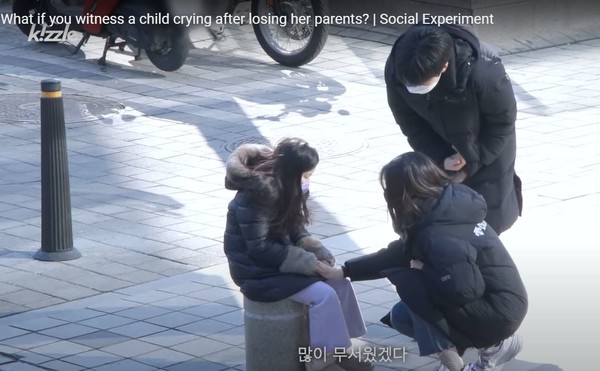
Launched in May of 2019 with the motto of “discovering the different perspectives of society,” Kizzle is a YouTube channel that primarily focuses on producing social experiments that highlight relevant social issues. While Kizzle may not exclusively be a child variety show, it is mainly recognized for its enlightening and heartfelt child-centered social experiments. Indeed, many viewers have enjoyed Kizzle’s show concept of using children to create interesting and diverse situations that test social issues like the morality of an individual in public.
In response to this praise about the channel successfully raising awareness for diverse social topics, Kizzle director Cho Min-hyuk emphasized that his show is not just about carelessly cherry-picking “moral lessons or social issues,” in an interview with The Yonsei Annals. Instead, director Cho believes that Kizzle tries to show the everyday problems of children that the audience can easily relate to. These everyday problems could be as simple as a child actor asking adults to tie their shoelaces or something of a more serious issue like a child actor being saved from bullying by an adult. Thus, the purpose of the social experiments is to focus more on authentically depicting the feelings of the child actors in difficult circumstances.
Indeed, director Cho’s argument that Kizzle portrays genuine child interactions with the adults is quite true since many of his videos emulate situations that occur in real life. For example, in an episode addressing the deteriorating effects of competitive academic culture on children’s family dynamics, a child actress is shown crying on a bench as she informs adults passing by that she is upset because her “parents fought” due to her having “no academic talent.” Without a second of doubt, passerby adults express their empathy for the child and frustration about how grades and educational talent are seen as such “important determinants of socioeconomic status” in Korean society—enough to potentially hinder children’s well-being as well as the ambiance of the household surrounding the child[2]. Kizzle’s subtle message on the absurdity of lesser school grades ruining the relationship between a parent and child is quite relevant. For children trapped in the cycle of toxic productivity at the hands of both the competitive academic culture and their parents’ disappointment, Kizzle’s child actress provides a raw and authentic outlook on how children feel about the pressure imposed upon them.
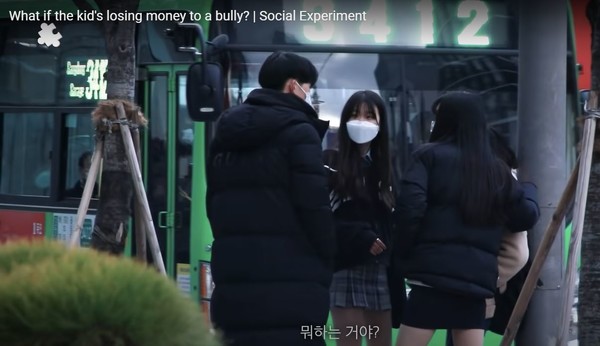
Aside from depicting relatable child-adult social interactions, the majority of Kizzle’s social experiments focus on how adults could help a child in unfortunate situations. For instance, in an episode of Kizzle, a child actress pretends to be bullied outside of school as passersby come to diffuse the situation and save the child from further bullying. According to The Korea Times, 65.2% of Korean students experience bullying[3], so the portrayal of an adult genuinely offering a helping hand to a bullied child is very important because it not only makes younger viewers feel safer in society but also educates the adults that interference is much needed in these situations. Hence, Kizzle’s social experiments provide a good blueprint for the viewers on what problems they should look out for in children on the street.
How the next generation of kids think in ODG
When it comes to portraying an authentic child perspective, ODG claims to be a pioneer since it is a Korean child variety show exclusively based on children. Created in 2018 by the clothing brand “ODG Kids,” ODG focuses on the perspectives of a recurring cast of child actors in Korea through their interviews with Korean celebrities and artists. The show’s concept is very simple where a child actor or a group of child actors sit at a table and organically talk about issues they face, like lowered self-esteem or depression. While fans have mainly appreciated ODG for introducing a platform that allows their favorite Korean celebrities to vent out their “vulnerable feelings,” many regular viewers have marveled at how articulate the ODG child actors are in representing a more “mature” child perspective.
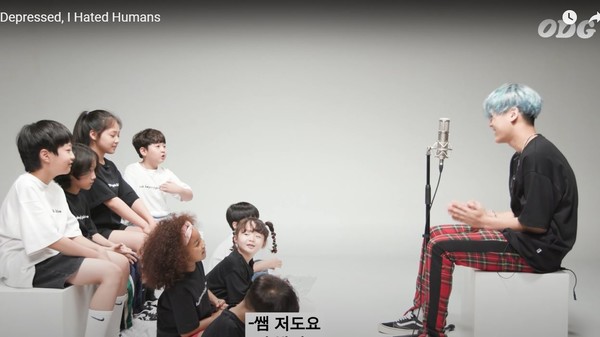
In order to justify ODG’s role as a relevant source for child perspectives, ODG creator Yoon Sung-won in an interview with a Korean newspaper news2day[4], explained that he feels adults seem to think of children as different beings and thus incapable of a mature conversation. Yoon finds this perception as untrue and hopes that ODG will relay the messages of adults and children in a thoughtful and mature manner.
In line with CEO Yoon’s perception of children’s perspectives as more nuanced and meaningful, ODG has produced many videos which tackle rather deep and serious social issues. For instance, in one episode, a rapper named Vinxen talks about his struggle with mental health, depression, and loneliness to a group of child actors. The rapper asks the child actors the reason why he might be depressed after being unable to say “I love you” to his mother. Undeniably, the issue underlined by Vinxen is quite relevant in Korean society since many Korean adults also scarcely converse about mental health-related issues with their peers[5]. ODG’s strategy of focusing on the children’s input is, therefore, unique because it allows the child actors to even unpack Vinxen’s questions about the connection of extreme emotions like anger, shyness, and alienation to the expression of love. These astute responses to the guest’s rather perplexing question and the subsequent casual discussions led by the child actors have been recurringly appreciated by viewers. One commenter even expressed support for ODG because they believed that it authentically depicted the contrast of a depressed person being alone and with children who gave off such positive energy and advice.
Indeed, ODG’s dedication to highlighting the contrast and similarity between the perspectives of both the child actor and celebrity is a highly intriguing aspect of the show. For instance, in one episode of ODG, K-pop duo AKMU’s Lee Su-hyun discussed her lowering self-esteem in her career. In response, two of the child actresses admitted that they were also gradually suffering from lowered self-esteem after going to middle school. The children went on to describe how they were caught in the inevitable culture of self-comparison and attaining the impossible Korean beauty standards. Many child or teenage viewers agreed with the sentiment of Lee and the child actresses and even termed their lowering self-esteem to be an unfortunately authentic social issue.
The parenting solutions in My Golden Kids
In a vastly different format from Kizzle and ODG, My Golden Kids is a Korean child variety show that focuses on providing parenting solutions to parents for their children. To provide these solutions, the show takes the help of therapist Dr. Oh Eun-young and a panel of experienced mothers who also happen to be veteran Korean celebrities like actress Shin Ae-ra, Jang Young-ran, and comedian Jeong Hyeong-don. First aired in May 2020 on Channel A, My Golden Kids has been renewed owing to its extreme popularity in raising awareness for behavioral therapy for children and is telecasting its third season on Netflix as well.
The recent 2022 season of My Golden Kids has received even more support nationwide due to its rather novel perspectives on how the audience and general Korean public should approach parenting. For example, in an episode airing on May 13, 2022, a couple was invited to the show to share their concerns over the extremely violent behavior of their daughter. The episode later reveals the reason for this when they show the parents continuously fighting with each other and scolding their daughter. Dr. Oh and the rest of the cast quickly point this out and advise the couple to talk more softly with their child. After this episode aired, many Korean netizens appreciated the therapist for her clever advice that did not focus on changing the child’s but rather the parent’s behavior.
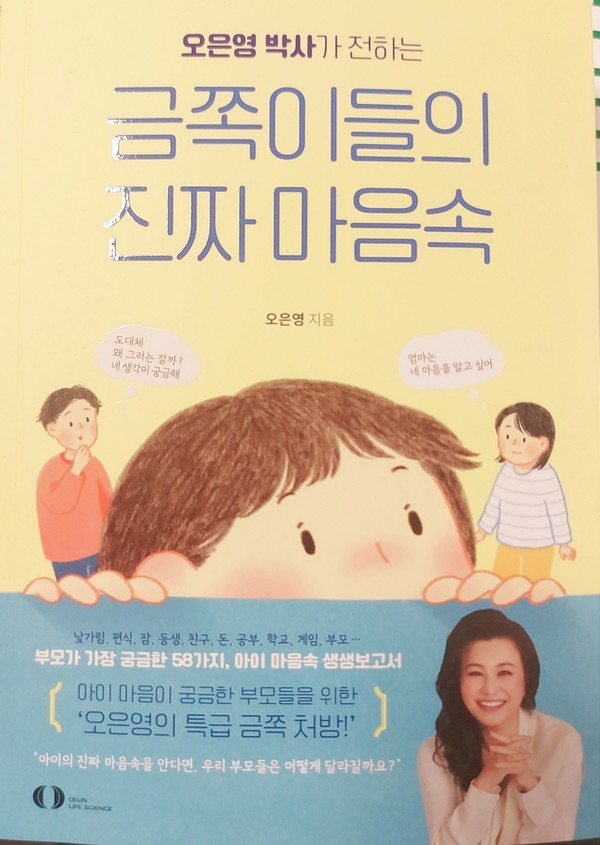
This format of providing parenting solutions has become a permanent genre of child variety show content where issues between a parent and their child are authentically brought to the forefront. In an interview with the Annals, Korean entertainment media critic Park Jae-yong shared his views on the reason he thought My Golden Kids would be a relevant and important addition to child variety show content: “Many Korean adults have not had the chance to be open with different issues regarding the ways they were raised, treated, or educated when they were children.” Park believes that while it is true that Korean society has gained consciousness on many issues like political correctness, equality, and gender, parenting issues are still new to many Korean parents. With solution-based child variety shows like My Golden Kids, these issues are coming to the forefront.
The side effects of insensitive depiction
While Korean child variety content does possess the ability to provide important insight into Korean sociocultural issues and incite necessary community conversations about child nurturing, it also runs the risk of insensitively portraying social issues to an easily influenceable cast of child actors and viewers. Viewers of Kizzle have criticized the show for tending to focus more on sensational topics that sometimes could unknowingly impact the child actor. In an interview with the Annals, a mother of Kizzle’s child actor did assure that Kizzle provided extremely good working conditions for her child and that they were not forced to do anything. However, the issue is not with being forced or bad working conditions but rather the dramatization of a social issue at the expense of a child actor. For instance, in the episode talking about the issues of toxic academic culture, Kizzle labeled the video as “what if you witness a child crying after losing her parents?” and played sad background music when the child was simply crying because her parents were just fighting and not gravely injured or ill.
For ODG, many viewers have commented on how it has become more of a promotional channel for Korean celebrities to talk about their latest projects rather than a channel authentically depicting child perspectives. For example, ODG has introduced a new segment where the child actors review the careers of second-generation K-pop idols such as SHINee with the idols present. The concept behind this segment is for child actors to honestly reflect on how the past music videos or fashion trends of these particular idols were in the past. As a result, the audience and the second-generation K-pop idols could better understand the recent trends of the next generation of children. Besides the obvious fact that these child actors cannot speak for the entire generation of Korean children, it is also slightly gratuitous for active K-pop groups to ask children for the latest fashion trends in their opinion when they themselves do represent or are aware of the trends already. Therefore, viewers believe that ODG’s aim of highlighting authentic child perspectives has begun to gradually lose its authenticity, especially since it does not individually ask about the opinions of child actors in detail anymore.
Furthermore, viewers have recently had a more pointed problem with the TV therapist, Dr. Oh, in episode 89 of My Golden Kids. In the episode, Dr. Oh advises a child who likes to wear makeup and wear girl clothes to take up taekwondo and mingle with other boys to appear less “effeminate.” In an interview with The Korea Herald[6], Public health and LGBT Human Rights of Korea activist Dr. Yi Ho-rim severely condemned the therapist’s methods by stating that Oh’s parenting solutions for the boy “lacks scientific backing,” adding that “an expert who should be aware said something that could spread the misunderstanding of children’s gender expression and it was even broadcast by the channel.” The nationwide broadcasting of one therapist’s opinion about a rather unfamiliar aspect of a child’s psyche could be rather problematic because they could inadequately shape the audience’s perception on the issue without them having time to do individual research. Netizens have also raised concerns about whether therapy for children in a variety show is an effective way of helping the children and their families. Many viewers are also worried about the potential bullying and privacy breach of the children that appear on the show for behavioral therapy.
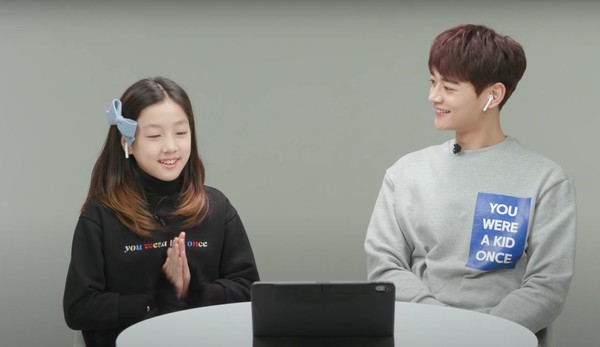
The solution for all these problems, however, is not to stop making relevant and diverse Korean child variety content. Instead, producers may have to tone down the sensational clickbait episode titles and dramatic background music effects to focus more on the child themselves. Above all, when recruiting advising experts, especially for children, Korean child variety shows should triple check before broadcasting a topic potentially damaging to the mental health of children.
* * *
Shows like Kizzle, ODG, and My Golden Kids are starting to provide a relevant and diverse way to portray the child perspective in the mainstream media. However, show producers and directors may have to take great care in picking relevant child-related social issues that are not overly sensationalized. In order to ensure this happens, Korean child variety shows should continue to diversify and introduce new formats that further encourage the portrayal of novel and authentic child perspectives.
[1] Hallyu 3.0: the Korean cultural wave that started in the mid- 2010s
[2] BMC Public Health
[3] The Korea Times
[4] news2day
[5] Harvard International Review
[6] The Korea Herald

